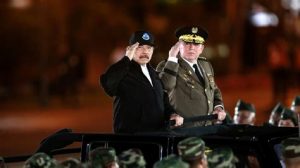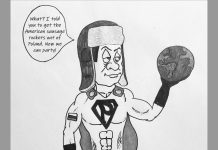Nicaragua is teetering on the edge of a complete fascist dictatorship run by its top thug and long-time president, Daniel Ortega. As reported by CNN, “Four months ahead of a crucial election, the government of long-time President Daniel Ortega has detained more than two dozen people since late May, including the six presidential candidates. Opposition leaders, student leaders, businessmen and activists have also been targeted.”

Ortega and His Misuse of Law
Using likely trumped-up charges of the murder of four policemen and the kidnapping of 12 police officers in 2018, the Ortega administration has rounded up and imprisoned presidential candidate Medardo Mairena Sequeira and farming and labor leaders Freddy Navas Lopez, Pablo Morales and Pedro Joaquin Mena Amador. While Ortega has a history of such political barbarism, his recent forays into oppression may be a high-water mark for Nicaragua and it’s increasingly beleaguered citizens. According to freedomhouse.org, Ortega and his goons have used Stalanist-like measure to keep opposition leaders and their supporters in check:
In October, the government passed two laws viewed as attempts to suffocate opposition: the Foreign Agents Law, which requires any Nicaraguan receiving funds from abroad to register as a foreign agent with the Interior Ministry, and prohibits such agents from engaging in political activities or holding public office; and the Special Cybercrimes Law, which criminalizes the dissemination of “false or distorted” information using communications technology.
In December, the government passed a law enabling officials to bar individuals labeled as “terrorists” or “traitors” from running for or holding public office. The country’s next presidential election will take place in November 2021.
Need a specific example? A Los Angeles Times article reports that “Nicaraguan National Police officers showed up at Dora María Téllez’s door moments after the former health minister had talked of seeking international help to push for a fair presidential election in the fall. Officers grabbed Téllez by the hair, her relatives said, punched her in the stomach, handcuffed her and loaded her into a car at her ranch on the outskirts of Managua, the nation’s capital.”
Ortega’s Past
Of course, this is nothing new for Ortega, who has consistently used police-state tactics to secure and maintain political advantage going back to the 1980s. As the leader in the Sandinista National Liberation Front, Ortega used the cult of communist uprising to cloak his bloodbath on the populace. The Nicaraguan Ministry of Health “estimated that over 3,600 civilians had been killed by Contra action, with many more being kidnapped or wounded” by 1985. And the violence continued, peaking in 2018.
Ryan C. Berg, a senior fellow at the Center for Strategic and International Studies, and Margarita R. Seminario, the deputy director and a senior fellow at the Center for Strategic and International Studies, report that “Nicaragua has been in the throes of Ortega’s dictatorial clampdown since a citizen uprising against him in April 2018, when hundreds of people were killed and thousands of people were injured, making it the worst wave of political violence in Latin America in three decades.”
Ortega, Russia, and China
And yet, there is a deeper story buried beneath this dynamic of widespread thuggery, one that hints at a strange international nexus between the Chinese and Russia governments and Central American countries. Although it has thus far failed to come to fruition, a proposed canal to connect the Caribbean Sea with the Pacific Ocean through Nicaragua was underwritten by Xinwei, a Chinese telecommunications company headed by billionaire businessman and self= declared “patriot” Wang Jing. While the canal project is in limbo due to financing issues, that is not the most interesting fact about Xinwei, which in reality is an economic collaboration between Russia and China.
Xinwei is part of NIRIT-XINWEI Telecom Technology Ltd. (NXTT), “a Russian-Chinese company established in 2012 for the deployment of an all-Russian professional wireless telecommunication network based on the McWiLL wideband multimedia 4G system of trunking radio communication,” as reported by the parent company’s website. The website also states the following:
Our main goal — building the Russian national technological platform that will be able to ensure the rollout of a professional telecommunication infrastructure for departmental / corporate users; such an infrastructure is expected to be modern, secure, independent of foreign vendors and be able, in the long run, to solve all the problem related to the deployment of critical important telecommunication facilities.
This activity is not limited to merely Russia, China, and Nicaragua, as the telecommunication giant has pressed into eastern Europe. According to Yicai Global, the English-language news service of Yicai Media Group, which serves the financial news arm of Shanghai Media Group, (China’s leading media concern after the China Central TV), “Ukraine’s antitrust body has given the green light” to the acquisition of Motor Sich, one of the world’s largest turbine engine makers.
Of course, we live in a globally interdependent economy, so such an alliance is not unusual. Still, context is everything, especially historical context. Though on the surface China and Russia have had a contentious relationship, they share a deeper philosophical connection.
Writing for The Center for the National Interest, a foreign-policy institute based on the political perspective of realism, Michael Clarke, Associate Professor at the National Security College, has this to say”:
In fact, the perceived belligerency of this China–Russia nexus is driven by a shared historical and ideological connection, which has manifested in both states adopting an authoritarian style government. Some analysts perceive this rigid style of governing as a representation of their mutual mistrust of the West, and a shared desire to rewrite the rules that shape the global order.
The willingness of Russia and China to deploy, or threaten the use of, military force to further their national interest, and challenge existing regional security orders, appears to confirm such pessimistic assessments. Whether it is Russia in Ukraine, or China in the South China Sea, both have demonstrated a militaristic disposition to resolving their historical territorial grievances.
Moreover, the Center for Security Policy states “Russia and China are now competing to arm anti-democratic and anti-U.S. regimes in Latin America, and may be cooperating to help Nicaragua build a trans-ocean canal, which may yield port access for Russian and Chinese warships.”
Meanwhile, the Biden administration’s reaction has been tepid. Speaking to the Washington Times, Christopher Sabatini, a Latin America scholar at Chatham House, a British think tank provided the following warning about Nicaragua: “It’s a poor country and a geostrategically insignificant country, but that doesn’t mean Nicaragua’s symbolic value is any less in terms of exposing a lack of U.S. influence in the region. The Biden administration has an opportunity here to take a loud and proud stand against what Daniel Ortega is doing. One way would be to mobilize multilateral sanctions and support for the Nicaraguan opposition, to rally international awareness for their plight and try to expose Ortega’s isolating, incoherent and immoral grip on power to his inner circle.”
This is an extremely crucial moment for the United States. After the specter of the wars in Iraq and Afghanistan, Americans are rightfully hesitant to get entangled in military interventions in Central America. But we also cannot just sit on our hands as Russia and China push their autocratic influence into Nicaragua and Ortega’s government destroys what little is left of the fragile democratic structures there. After all, the dead and imprisoned cannot vote for change.
Gonzalo Carrión, 60, was the legal director at the Nicaraguan Center for Human Rights in Managua before he became an exile in Costa Rica in December 2018, has apparently not lost a sense of optimism, stating, “The time will come. The Nicaraguan people figured out how to free themselves of other dictatorships, and this one won’t be the exception.”
Let’s hope Mr. Carrión is correct and that the Untied States finds a peaceful and effective method to curb Ortega’s potential to use of genocide as a means of political control.
At Newsweed.com, we adhere to three simple principles: truth, balance, and relatability. Our articles, podcasts, and videos strive to present content in an accurate, fair, yet compelling and timely manner. We avoid pushing personal or ideological agendas because our only agenda is creating quality content for our audience, whom we are here to serve. That is why our motto is ”Rolling with the times, straining for the truth.”
Your opinion matters. Please share your thoughts in our survey so that Newsweed can better serve you.
Charles Bukowski, the Los Angeles beat poet that captured the depravity of American urban life once said, “There is something about writing poetry that brings a man close to the cliff’s edge.” Newsweed is proud to stand in solidarity and offer you a chance to get close to the cliff’s edge with our first Power of Poetry Contest. Are you a budding bard, a versatile versifier, a rhyming regaler? Do you march to the beat of iambic pentameter, or flow like a river with free verse? If so, here’s your opportunity to put your mad poetic chops to the test. Enter our poetry contest for bragging rights and an opportunity to win some cash!






